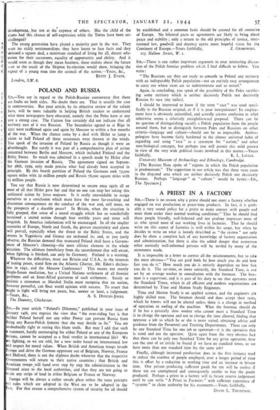POLAND AND RUSSIA sm,—You say in regard to the Polish-Russian
controversy that there are faults on both sides. No doubt there are. That is usually the case
in controversies. But your article, by its objective review of the salient facts, will be most valuable in helping British readers to understand what most newspapers have obscured, namely that the Poles have at any rate a strong case. The Curzon line certainly did not indicate that all territory east of it was Russian. The boundaries agreed to at Riga in 1921 were reaffirmed again and again by Moscow to within a few months of the war. When the chance came by a deal with Hitler to jump a claim to half Poland all these assurances were thrown to the winds. You speak of the invasion of Poland by Russia as though it were an afterthought. But surely it was part of a comprehensive plan of action concerted between Berlin and Moscow, which included Finland and the Baltic States. So much was admitted in a speech made by Hitler after the German invasion of Russia. The agreement signed on Septem- ber 28th, 1939, only made precise what had already been accepted in principle. By this fourth partition of Poland the Germans took 73,000 square miles with 22 million people and Russia 78,000 square miles with 13 million people.
You say that Russia is now determined to secure once again all or most of all that Hitler gave her and that no one can stop her taking this unilateral action by force majeure. Is it really unavoidable to resign ourselves to a conclusion which must have the most far-reaching and disastrous consequences on the conduct of the war and, still more, on the prospects of a durable peace? In Britain, when the situation is fully grasped, that sense of a moral struggle which has so wonderfully sustained a united nation through four terrible years and more will languish. In America isolationism will be encouraged. In all the smeller countries of Europe, North and South, the gravest uncertainty and alarm will prevail, especially when the threat to the Baltic States, and the events in Yugoslavia and Greece are reckoned in; and, as you justly observe, the Russian demand that truncated Poland shall have a Govern- ment of Moscow's choosing—the most sinister element in the whole situation. The ultimate beneficiary from the unsettlement that will ensue, when fighting is finished, can only be Germany. Finland is a warning.
Whatever the difficulties, must not Britain and U.S.A., in the interests of lasting peace, stand firm on the Atlantic Charter,_-Mr. Eden's declara- tion in 1941, and the Moscow Conference? This means not merely Anglo-Saxon mediation, but a United Nations settlement of all frontier problems and an Inter-Allied guarantee of such settlement. Surely so realistic a statesman as Marshal Stalin -must recognise that no nation, however powerful, can flout world opinion with success. To assert that t is bight will bring not peace, but, sooner or later, a judgement.


























 Previous page
Previous page